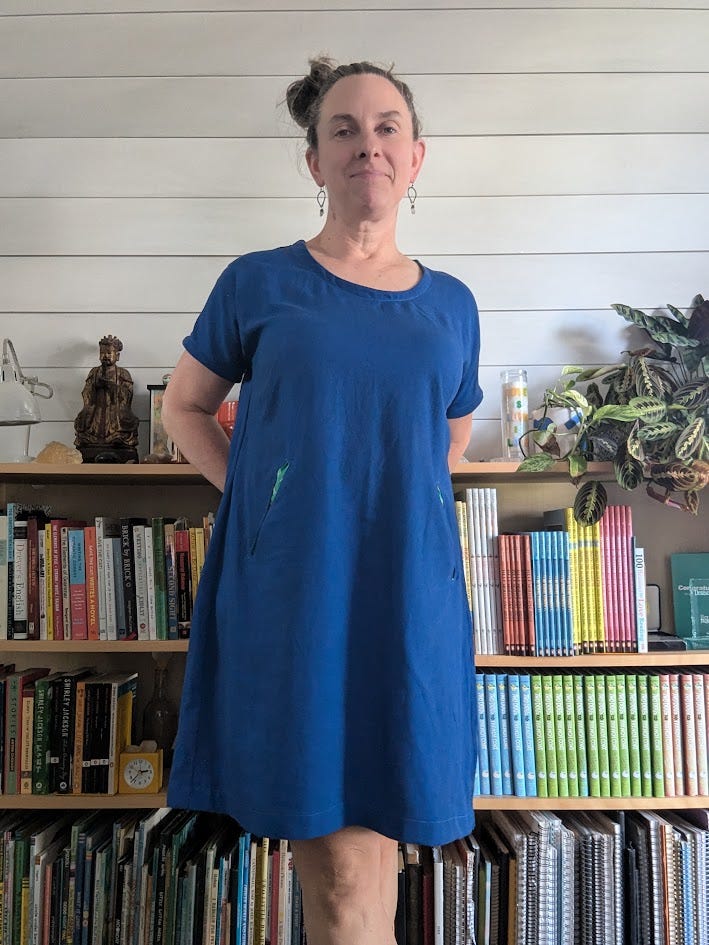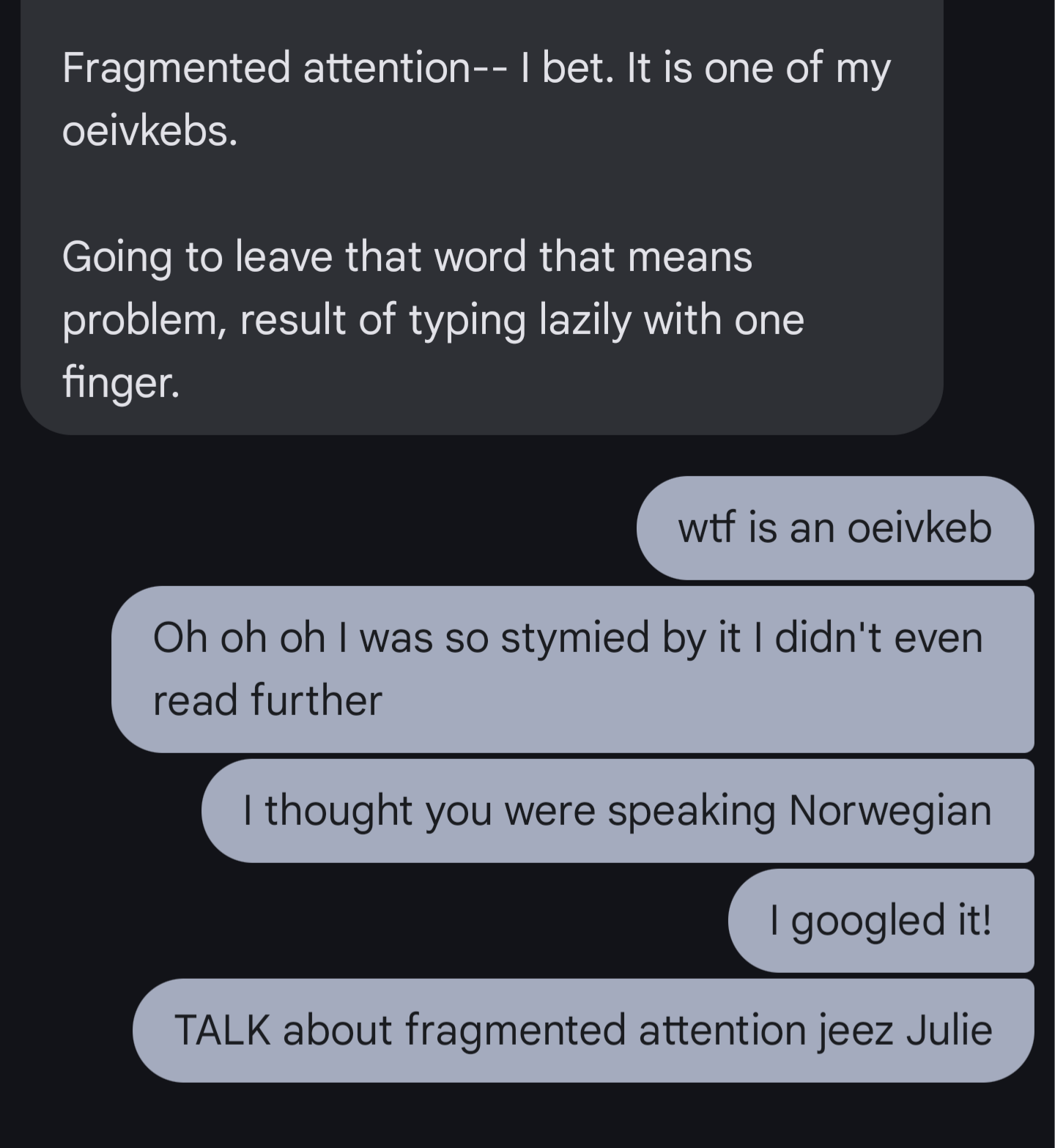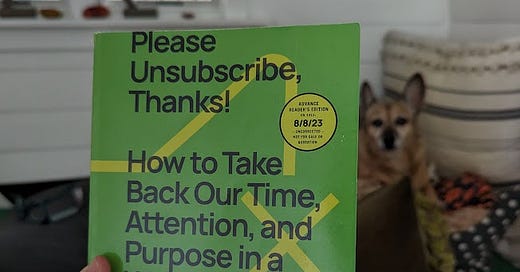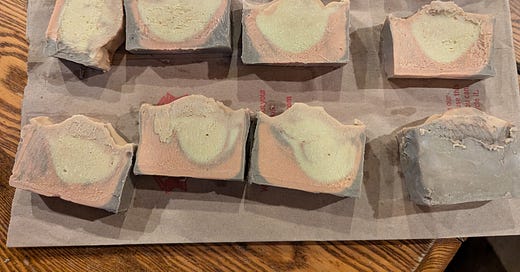
Discover more from Do the Work
I spent last week lying around, resting and recovering from covid. I wrote last Monday about how restless I was and how bored it made me to not be able to get things done. But I knew I’d heal faster if I rested. So I rested.
I read The Nix1 by Nathan Hill, which I loved (I also loved his newer book, Wellness2). I kept trying to read nonfiction, but it was too much thinking. I re-watched “Wanderlust” (I will watch Kathryn Hahn in anything, and her saying “I’m sorry if my hands smell like tahini, I was just making some hummus” is something I think about all the time). My family has been making our way through “Superstore” and we were at the end, so they watched the last three episodes inside, while I ate by myself and watched them alone (this sounds sadder than it should; it was fine).
I developed a symptom called pulsatile tinnitus, which for me was the ear-ringing of tinnitus, plus also the sound of my own heartbeat whooshing in my head. It was incredibly loud. I did a lot of lying around, listening to the noise in my head, unable to hear much else.
What was really interesting, though, was how quickly I got distracted, how easily I slipped into a phone- and internet-led fragmented attention span. I did morning pages while checking texts. I spent a ridiculous amount of time browsing for and researching vintage sewing patterns (including watching videos called things like “Top Tips for Sewing with a Vintage Pattern!!!”), and bought four of them off of eBay (I might not regret this, we’ll see). I scrolled a lot on Instagram. I refreshed the New York Times home page and was annoyed with myself every time.
I wrote a text to my friend Susannah about my fragmented attention, which she responded to hilariously, and then I was so fragmented that I couldn’t even read her entire text (granted, I was sick, but still).
It was really when I was writing morning pages with my phone next to me that pushed me over the edge. The entire point of morning pages is to write three pages stream of consciousness without stopping. If I stop and check my messages, I’m ruining it for myself.
The good news is that it wasn’t hard to reverse this troubling trend of inattention and distraction. I still don’t quite have the mental stamina for writing and revising fiction, but I’m no longer feeling so fragmented. I knew I wasn’t going to be doing any deep work (I’m still too tired), but I could focus on undistracted single-tasking (and on what Cal Newport often calls “high quality leisure,” a term I’m not sure I love since it sounds like it only refers to elite pursuits like chess and learning to speak another language, but in fact it could mean purposefully and mindfully choosing a delightful trashy movie to watch in one go, spending three hours drawing a purple chalk line around your neighborhood, or learning to twerk3).
Here’s what I did to get my attention back:
I banished my phone from my writing shed. It’s usually not allowed in here. But it talked its way into staying when I was isolating out here. Forget that. Goodbye, phone.
I started going on slightly longer walks, which was good for me (and the dog) and good to just get the blood moving back to my brain, even if it was annoying to wear a mask.
I purposely set aside more time for reading. I’m glad my brain was still able to read even though I was tired and my head was loud. (I’ve got a good list going for this year’s round of the Short Story Project, which is where we read short stories and write picture books in response to them.)
I watched a movie, as detailed above.
I sewed a dress. Sewing is a fast-track to flow for me, because it takes so much concentration and figuring things out. Honestly it was too much in my current state, since by the end of the day my ears were ringing and I was exhausted. Oops. So it was good for my attention (and my closet) but not great for my covid recovery.

Like always, it’s all about paying attention to how things feel. There was a moment when I was scrolling on Instagram last week and I thought, oh no, I’ve ruined everything. I wondered if I was now once again addicted to my phone and to social media, if I was back to looking to the feed for attention. I worried I would struggle against the pull of the internet to get books written.
I immediately assumed that the allure and stickiness of digital distractions would overpower my ability to create things. I had forgotten, briefly, that my drive and desire to create is stronger than the noise of the algorithm. Which is good news!
We all get distracted, whether it’s because we’re tired or sick or everything is flashing in our faces. We don’t have to stay distracted, though. We can step away from it all and do something to strengthen our focus (even something small). Those moments add up, and each of them makes it easier to create something big and beautiful when we’re ready and able to.
Thoughts and Links
Interesting thoughts about marketing in Chiseling Away the Generic by
Love this in-depth look at how Loren Long created his latest picture book (NYT unlocked link)
This is the fifth week in a row that this bean salad has made it into the rotation. Serve it with chicken and some sort of bread (flatbread, corn muffins, sourdough) and you will satisfy the carnivores and vegetarians at the table. Dave has been bringing it on hikes for lunch at the top of the mountain with a piece of crusty bread, also.
Books I read recently and loved
Disclosure: book links in this newsletter are affiliate links to Bookshop.org, a site which supports independent bookshops.
AHOY! by Sophie Blackall is a delight.
The Last Stand by Antwan Eady is heartfelt and gorgeous (as anything illustrated by Jarrett and Jerome Pumphrey is).
Teeny-Weeny Unicorn by Shawn Harris did not go in the direction I thought it would, and I loved it.
Read this book as a mentor text on pacing and seamlessly head-hopping. There is one sentence that goes on for 13-and-a-half pages in a way that expertly matches the exact inner workings of the character, and it’s astonishing and perfect.
Read this one for a perfect description of how, exactly, people get radicalized by the lies of the internet and algorithms.
Cal Newport’s recent discussion of deep habits was interesting to me, and specifically his call to do hard things in order to create discipline. That feels like a simple definition that I can remember and adjust to my circumstances — namely, that doing a hard thing is going to be different as I recover from an illness than when I’m feeling fine.
Subscribe to Do the Work
How to get writing done when the distractions of modern life are coming at you fast.



















Appreciate the mention, Julie! And so sorry to hear you’re feeling terrible. I hope you get the necessary rest you need!
Fellow Kathryn Hahn Fan Club member here! She is amazing. Also I love Shawn Harris too. Great choices :) Here's to continued health improvement and improved focus! I could use some of that here as well. We got this!